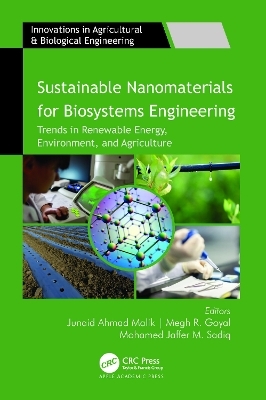
Sustainable Nanomaterials for Biosystems Engineering
Apple Academic Press Inc. (Verlag)
978-1-77491-201-0 (ISBN)
This new volume explores the integration of bionanomaterials and sustainable resources for the development of new and emerging sustainable processes. It highlights the concept of essential bionanomaterials derived from sustainable resources with examples of interdisciplinary methodologies and research that highlight the reuse of biomass waste as well as the proper usage of green technologies. The volume considers the most recent trends, challenges, and applications in bionanomaterials derived from sustainable sources in energy production and environmental mitigation.
The book looks at state-of-the-art trends in the use of bionanomaterials for renewable energy such as in production of solar energy, for energy harvesting, and for energy conversion and storage. Chapters consider the application of bionanomaterials for the development of improved optical and electrical biosensors. The volume goes on to address the promising use of bionanomaterials for environmental remediation, such as for recovering heavy metals, radioactive metals, and other pollutants from wastewater, from river water, from soils, etc. Other topics include the use of sustainable nanomaterials in the food industry, in the biomedical field, in ecological research, and more.
Junaid Ahmad Malik, PhD, is a Lecturer with the Department of Zoology at Government Degree College, Bijbehara, Kashmir (J&K), India, and is actively involved with teaching and research activities. He has more than eight years of research experience. His areas of interest are ecology, soil macrofauna, wildlife biology, conservation biology, etc. Dr. Malik has published 21 research articles and technical papers in international peer-reviewed journals and has authored and edited books, book chapters, and more than 10 popular editorial articles. He also serves as an editor and reviewer of several journals. He has participated in several state, national, and international conferences, seminars, workshops, and symposia and has more than 20 conference papers to his credit. Megh R. Goyal, PhD, PE, is a Retired Professor in Agricultural and Biomedical Engineering from the General Engineering Department in the College of Engineering at the University of Puerto Rico–Mayaguez Campus. He was proclaimed as the "Father of Irrigation Engineering in Puerto Rico for the twentieth century" by the ASABE, Puerto Rico Section, for his pioneering work on micro irrigation, evapotranspiration, agroclimatology, and soil and water engineering. During his professional career of over 52 years, he has received many prestigious awards. A prolific author and editor, he has written more than 200 journal articles and several textbooks and has edited over 100 books. Mohamed Jaffer M. Sadiq, PhD, is a Postdoctoral Researcher at the School of Chemical Science and Technology at Yunnan University in Kunming, P.R. China. Dr. Sadiq has published over 20 research and technical papers in international peer-reviewed journals. He is also serving as an editor and reviewer for several journals. He has participated in several state, national, and international conferences, seminars, workshops, and symposia. Dr. Sadiq has more than 10 years of industrial and research experience. His areas of interest are photocatalysis, heterogeneous catalysis, wastewater treatment, biomaterials, bio-nanotechnology, etc.
PART I: BIONANOMATERIALS FOR RENEWABLE ENERGY SOURCE TRENDS 1. Usage of Bionanomaterials in Production of Solar Energy 2. Scope of Bionanomaterials in Generation of Solar Energy 3. Advanced Electrochemical Bionanomaterials for Energy Conversion and Storage PART II: NANOMATERIALS FOR BIOSENSING APPLICATIONS 4. Carbon Nanomaterials for Optical and Electrical Biosensors 5. Recent Trends in Graphene-Derived Applications for Energy Harvesting and Biosensing 6. Nanomaterials for Biosensing Applications: Concepts and Recent Advancements PART III: BIONANOMATERIALS FOR RENEWABLE ENVIRONMENTAL TRENDS 7. Advanced Bionanomaterials for Environmental Remediation 8. Advanced Bionanomaterials for Environmental Clean Recovery Process 9. Advanced Bionanomaterials for Heavy Metals and Radioactive Metals Recovery Process 10. Advanced Bionanomaterials Used to Recover Pollutants from Wastewater 11. Role of Nanomaterials in the Treatment of Polluted Cauvery River Water in Tiruchirappalli District (TamilNadu) 12. Potential Nanomaterials for Bioremediation and Biodegradation 13. Smart Nanomaterials for Bioremediation and Biodegradation: Laboratory and On-Site Applications and Future Trends PART IV: NANOMATERIALS FOR SUSTAINABLE DEVELOPMENT 14. Scope of Nanotechnology in Biomedical and Ecological Research 15. Green Nanotechnology: The Novel and Emerging Strategy for Sustainable Development 16. Sustainable Nanomaterials for the Food Industry: Current Scenario and Perspectives
| Erscheinungsdatum | 17.04.2023 |
|---|---|
| Reihe/Serie | Innovations in Agricultural & Biological Engineering |
| Zusatzinfo | 30 Tables, black and white; 19 Illustrations, color; 44 Illustrations, black and white |
| Verlagsort | Oakville |
| Sprache | englisch |
| Maße | 156 x 234 mm |
| Gewicht | 1038 g |
| Themenwelt | Schulbuch / Wörterbuch |
| Medizin / Pharmazie ► Physiotherapie / Ergotherapie ► Orthopädie | |
| Technik ► Elektrotechnik / Energietechnik | |
| Technik ► Maschinenbau | |
| Technik ► Medizintechnik | |
| Technik ► Umwelttechnik / Biotechnologie | |
| ISBN-10 | 1-77491-201-5 / 1774912015 |
| ISBN-13 | 978-1-77491-201-0 / 9781774912010 |
| Zustand | Neuware |
| Informationen gemäß Produktsicherheitsverordnung (GPSR) | |
| Haben Sie eine Frage zum Produkt? |
aus dem Bereich


